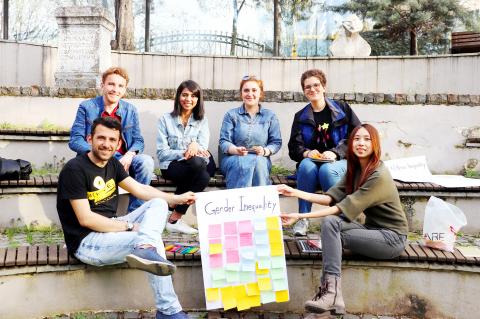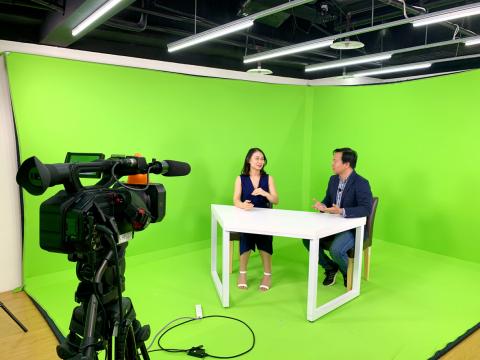When a group of Taiwanese students in Norway sued the Norwegian government last year for changing the nationality on their residency permits to China, they naturally engaged a lawyer to fight their legal battles. But to win over the court of public opinion, they would need a very different kind of representation.
Enter the Taiwan Digital Diplomacy Association (台灣數位外交協會, TDDA). Founder Kuo Chia-yo (郭家佑), 28, tells the Taipei Times that the group will be helping the Taiwanese students with their digital outreach this year. It’s one of several digital diplomacy projects the non-government organization has taken on since its establishment in 2017.
Using new digital tools and social media, coupled with old-fashioned cultural observation, TDDA is spearheading a unique approach to boost Taiwan’s profile on the global stage, and broaden the nation’s constrained space for international exchanges. Its work is also filling a notable gap in Taiwan’s official approach to public diplomacy.

Photo courtesy of Taiwan Digital Diplomacy Association
GRASSROOTS DIPLOMACY
“We’re not like a typical government project that goes out to promote Taiwan by saying we’re great or asking everyone to come check us out,” Kuo says. “Our approach is more like networking, to find things that we can do together with locals [of other countries] on social media.”
TDDA is a lean outfit, with only two full-time and eight part-time staff, but its reach is imaginative. Kuo, who now flits between Taipei and Ho Chi Minh City, has so far taken the organization to Kosovo and Vietnam.

Photo courtesy of Taiwan Digital Diplomacy Association
In Kosovo, a landlocked state in Southeastern Europe, Taiwan has a natural friend in the shared experience of being a country with only partial international recognition.
In 2017, TDDA ran a social media campaign advocating Kosovo’s digital independence by having its own national Internet domain. A video of young Taiwanese declaring their support for Kosovo attracted 32,000 views on Facebook, gaining precious traction for Taiwan in the nation of nearly two million.
Last summer, the group worked with the Kosovo Cultural Exchange Association to produce an exhibition on visions of Kosovo’s future at the national museum in the capital Pristina. The project involved Taiwanese designers and interactive digital exhibitions such as a “democracy wall,” where visitors voted for the social changes they most desired to see in Kosovo.
In Vietnam, TDDA has set up Taiwan Corner, a cafe and exhibition space, and produced an Internet medical talkshow series featuring a panel of Vietnamese doctors talking about medical issues that locals commonly face.
If the links to Taiwan seem indirect, that’s the intention. The idea is to earn Taiwan more friends and supporters by first showing a concern for causes that are important to the citizens of other countries.
For its projects in Vietnam, the organization has also worked closely with Vietnamese students in Taiwan, further strengthening offline, people-to-people ties between the two countries.
Kuo sees this as a way of forging connections that are more resilient to geopolitical power dynamics, especially in the face of growing Chinese pressure that has seen the number of Taiwan’s diplomatic allies fall to 15.
“When people really see you as a friend, they won’t cut you off just because of China,” Kuo says. “What will get cut off is government relations, but not people-to-people connections.”
SOCIAL MEDIA PROFILE
With the proliferation of social media and data-driven technologies, the use of digital diplomacy to win over hearts and minds abroad is a growing priority for foreign offices around the world.
In particular, digital diplomacy is proving to be an essential tool where there are no formal diplomatic ties. Israel’s Ministry of Foreign Affairs runs several Arabic-language social media platforms to reach out to the citizens of Arab countries with which the country does not have diplomatic relations.
The potential for Taiwan, which boasts a high Internet and smartphone penetration rate, is obvious. Yet there are still disparities between the government’s grasp of social media for domestic and international audiences.
While the government already leverages Facebook, Twitter, YouTube, LINE and local influencers for domestic messaging, digital diplomacy directed at the rest of the world has developed at a much slower pace.
The Ministry of Foreign Affairs only started a Twitter account in April 2018, and Kuo cites the fact that the country’s overseas representative offices have only recently started making their social media posts in English or the vernacular language.
Kosovo’s digital independence and the medical concerns of Vietnamese may seem remote from Taiwan’s international standing, but these are issues that TDDA landed on after building social media profiles of both countries. The objective is to identify causes that Taiwanese and citizens of that country can work on together, exchanging their shared values.
Kuo says that it takes the team several months to trawl through social media profiles, groups and hashtags to gain a feel for the preoccupations of their citizens and their impressions of Taiwan.
For example, TDDA conceptualized the medical talkshow after their efforts revealed that health is one of the top discussion topics for Vietnamese on social media, but that few think of Taiwan as a destination for medical tourism.
TDDA is still in the midst of building its digital strategy for the Taiwanese students’ lawsuit against Norway, but Kuo says that for a start, they plan to use Norwegians’ love of music to familiarize them with Taiwan.
These are skills that TDDA wants to impart to more young Taiwanese. At a digital diplomacy workshop in May last year, participants found that when it comes to Taiwan, East Asians concern themselves with the country’s tourism offerings and elections, Eastern and Southern Europeans think of restaurants and an air gun shop called Taiwan Gun, while Latin Americans have developed a taste for Taiwanese drama serials. Most Africans, however, have no impression of the country.
Such social media insights provide rare granular detail for understanding how Taiwan is perceived internationally.
Kuo still faces challenges in forging the local connections needed to get TDDA’s projects off the ground, and her own family’s inability to understand her unconventional career path. But she believes that the value of digital diplomacy will only strengthen for Taiwan’s future generations of digital natives.
“In the past they might have felt that diplomacy is something the government does and it has no connection to me. But now, because the channels that we use are social media, it’s something that everyone knows. So more people feel that actually, they can do something,” Kuo says.

April 14 to April 20 In March 1947, Sising Katadrepan urged the government to drop the “high mountain people” (高山族) designation for Indigenous Taiwanese and refer to them as “Taiwan people” (台灣族). He considered the term derogatory, arguing that it made them sound like animals. The Taiwan Provincial Government agreed to stop using the term, stating that Indigenous Taiwanese suffered all sorts of discrimination and oppression under the Japanese and were forced to live in the mountains as outsiders to society. Now, under the new regime, they would be seen as equals, thus they should be henceforth

Last week, the the National Immigration Agency (NIA) told the legislature that more than 10,000 naturalized Taiwanese citizens from the People’s Republic of China (PRC) risked having their citizenship revoked if they failed to provide proof that they had renounced their Chinese household registration within the next three months. Renunciation is required under the Act Governing Relations Between the People of the Taiwan Area and the Mainland Area (臺灣地區與大陸地區人民關係條例), as amended in 2004, though it was only a legal requirement after 2000. Prior to that, it had been only an administrative requirement since the Nationality Act (國籍法) was established in

With over 80 works on display, this is Louise Bourgeois’ first solo show in Taiwan. Visitors are invited to traverse her world of love and hate, vengeance and acceptance, trauma and reconciliation. Dominating the entrance, the nine-foot-tall Crouching Spider (2003) greets visitors. The creature looms behind the glass facade, symbolic protector and gatekeeper to the intimate journey ahead. Bourgeois, best known for her giant spider sculptures, is one of the most influential artist of the twentieth century. Blending vulnerability and defiance through themes of sexuality, trauma and identity, her work reshaped the landscape of contemporary art with fearless honesty. “People are influenced by

The remains of this Japanese-era trail designed to protect the camphor industry make for a scenic day-hike, a fascinating overnight hike or a challenging multi-day adventure Maolin District (茂林) in Kaohsiung is well known for beautiful roadside scenery, waterfalls, the annual butterfly migration and indigenous culture. A lesser known but worthwhile destination here lies along the very top of the valley: the Liugui Security Path (六龜警備道). This relic of the Japanese era once isolated the Maolin valley from the outside world but now serves to draw tourists in. The path originally ran for about 50km, but not all of this trail is still easily walkable. The nicest section for a simple day hike is the heavily trafficked southern section above Maolin and Wanshan (萬山) villages. Remains of